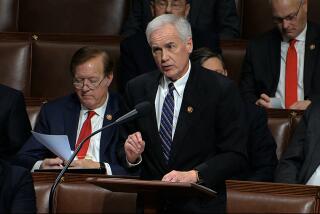Quackenbush’s Lesson for the GOP: Steer Clear of Scandal
SACRAMENTO — Although the evidence of wrongdoing was mounting, Chuck Quackenbush quit as state insurance commissioner primarily because his political base collapsed. No one in his Republican Party would defend him. Consequently, he could not fight off the threat of impeachment. He still faces civil and criminal investigations for his use of insurance-company settlement money to set up foundations, but at least the GOP won’t have him around its neck this fall.
State Republicans learned an important lesson from this scandal: stonewalling is not always the best policy. When Quackenbush first came under fire, he claimed Democrats were out to get him. His wife, in a statement eerily reminiscent of Hillary Rodham Clinton’s charges against right-wing Republicans during Bill Clinton’s darkest moments, insisted her husband was a victim of a vast Democratic and media conspiracy.
This tactic failed because his former Republican colleagues in the Legislature--Quackenbush served four terms in the Assembly--did not rise to his defense. By late June, Quackenbush’s political base had disintegrated, and Republicans were leading the charge to get him out of office even though the commissioner had led the GOP ticket in 1998 and was seriously talked of for higher office. His harshest critic was Assemblyman Tom McClintock of Simi Valley, one of the Legislature’s most senior Republicans and a leader of its conservative wing.
Two interesting twists help explain Quackenbush’s loss of GOP support. First, he failed to care for his own Republican constituency. The foundations under investigation by Atty. Gen. Bill Lockyer were ostensibly set up to benefit victims of the Northridge earthquake. These are Republicans; Quackenbush handily carried the Northridge area in his reelection. Instead of benefiting his own people, the foundation money was allegedly spent to benefit him.
Second, Quackenbush surrounded himself with remnants of former Gov. Pete Wilson’s political team. In many GOP quarters, the Wilson team is blamed for setting the stage for the Republican debacle of 1998.
Nevertheless, the GOP abandonment of Quackenbush runs counter to virtually every other recent political scandal, in which partisans rallied around the target of scandal, even at the cost of their own scalps. For example, in 1973-74, Republicans defended President Richard M. Nixon for so long that when he finally quit in mid-1974, voters punished them in that fall’s elections. More recently, Democrats rallied around President Bill Clinton when he was impeached and tried in the Senate.
Sen. Jackie Speier (D-Daly City) once suggested that Quackenbush might employ a strategy of Clinton-like stonewalling to save himself. But Clinton’s defense worked because his party stayed loyal to him. McClintock and other Republicans who refused to defend Quackenbush seemed to instinctively appreciate the long-term political price of saving an officeholder irreparably stained by scandal.
Consider the scenario if Democrats had not rallied around Clinton and had led the charge to force the president’s resignation after the Monica S. Lewinsky scandal broke. A President Al Gore probably would have helped Democrats carry both houses of Congress in 1998, a much better political year for them than many realized. Gore would be a landslide favorite this year, too.
Instead, polls show the vice president trailing Texas Gov. George W. Bush. Furthermore, Democrats, once thought to be ensured of taking back the House, are now no better than 50-50 to win it and are believed to have almost no chance to control the Senate. As for Clinton, scandal has clearly weakened his presidency. Sen. Jesse Helms (R-N.C.) killed his comprehensive test-ban treaty last year and lectured him not to make a deal with the Russians this year. Senate Republicans play with his judicial nominations like a cat with a ball of yarn, confirming only a handful and then only after Clinton makes a trade-off. His domestic agenda is in shambles, except for a China trade bill that Republicans wanted more than Democrats.
The point is not to compare Clinton and Quackenbush but to underscore that the political instinct to save a party stalwart fatally wounded by scandal is wrong. Few Republicans looked forward to discussing Quackenbush’s record as insurance commissioner in the coming elections. Now they won’t have to.
McClintock emerges from the Quackenbush scandal a man of principle because he did not lead Republicans into a orgy of excuse-making. In one sense, McClintock’s not an unusual hero. Around Sacramento, he is considered a pain in the neck, an inveterate tax cutter who eschews compromise on many issues. So his principled stand in the Quackenbush matter was not that surprising. He deserves much of the credit for making it possible to quickly resolve the scandal in the Insurance Department, even if that means replacing Republican Quackenbush with a Democratic appointee.
McClintock should not let up. Quackenbush was forced out of office because he allegedly used foundations set up to benefit earthquake victims as a political slush fund. But what about campaign strategists, polling operations and fund-raising machines that operate on state time with taxpayer money in Sacramento? Quackenbush’s political operatives apparently played a common game: using public money to spruce up their boss’ political image. Is it any different when legislators of both parties do the same thing with their state-paid staffs?
A thorough investigation of the relationship among political money, campaign activities and public duties of California officials is long overdue. The best result of the Quackenbush scandal would be to find out where else such behavior takes place. *
More to Read
Get the L.A. Times Politics newsletter
Deeply reported insights into legislation, politics and policy from Sacramento, Washington and beyond. In your inbox three times per week.
You may occasionally receive promotional content from the Los Angeles Times.










